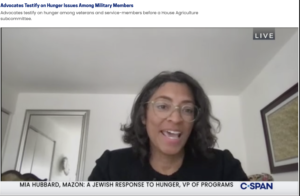On the Eve of Veterans Day, MAZON Delivers Powerful Congressional Testimony About Veteran and Military Hunger
Today, on the eve of Veterans Day, leading anti-hunger experts, veterans, and advocates urged immediate action to combat food insecurity among the nation’s veteran and active-duty military community during a hearing hosted by the House Agriculture Subcommittee on Nutrition, Oversight, and Department Operations.
Mia Hubbard, Vice President of Programs at MAZON: A Jewish Response to Hunger, drew on nearly a decade of MAZON’s leadership in spotlighting and addressing military and veteran hunger, urging lawmakers to act immediately this Veterans Day to advance policy solutions.
“There is simply no reason that military families and veterans should experience the painful reality of hunger. Military and veteran families have been allowed to go hungry on your watch,” said Mia Hubbard, Vice President of Programs at MAZON: A Jewish Response to Hunger, during her testimony. “Your inaction has allowed this situation to persist for years and to grow worse over the course of the pandemic. Food insecurity exacerbated in military and veteran populations during COVID-19, contributing to the worsening of diet-related chronic disease, lost productivity, and even spikes in suicide rates.”
Read Hubbard’s prepared testimony here.
The long-term nature of the problem was highlighted by subcommittee member and longtime anti-hunger champion Rep. Jim McGovern, who cited MAZON’s leadership and noted that Congress and the Administration have failed to act, despite knowing about the issue for years.
“This is not a new issue. We’ve been talking about this, you’ve been talking about this, MAZON has been talking about this for years,” he said during Wednesday’s hearing. “The bottom line is that the powers that be haven’t done anything about it. The Pentagon has known about this for years, and yet they have not come up to the Hill and ask that we not count the housing allowance towards total income so that those people who are struggling could actually get SNAP — they haven’t done that.”
”No person should ever go hungry in America,” said subcommittee chairwoman Rep. Jahana Hayes. “However, it is especially galling to see those who have dedicated their lives to serving our nation struggle to put food on the table.”
“I think we all believe these issues represent a failure of our government — to serve those who have served us,” said subcommittee member Rep. Jimmy Panetta. “That’s why I was proud to introduce the bipartisan Military Hunger Prevention Act, and I was fortunate to have the support of my colleagues on this subcommittee — Representatives Bacon, Baird, and Carbajal. I believe it’s our responsibility to ensure that military families, at the least, have access to this necessary support that they need to lead healthy, food secure lives.”
Based on years of study, analysis, and advocacy, MAZON has identified a number of key areas in which Congress and the Administration have the power to resolve food insecurity among veteran and military families. For the veteran population, Hubbard shared MAZON’s policy recommendations to protect and improve SNAP and better integrate nutrition assistance into VA outreach and programming, including providing information about federal nutrition programs like SNAP as part of existing veteran transition and veteran military prevention programs. Hubbard emphasized, “Success should be measured not by how many food pantries operate at VA centers, but rather by how many food pantries become unnecessary due to veteran households receiving the support they need —and are entitled to! — through programs like SNAP.”
For military families, Hubbard raised several of MAZON’s proposals, many of which are outlined in MAZON’s recent report, “Hungry in the Military: Food Insecurity Among Military Families in the U.S.” She underscored that,
“The single most impactful action Congress can take right now is to support MAZON’s proposal to create a Military Family Basic Needs Allowance, which is already in the National Defense Authorization Act (NDAA) that passed the House on September 23 with bipartisan support. This would remove a barrier to nutrition assistance that has existed for too long.”
Watch the full hearing here:
Currently, the Senate is awaiting a vote on its version of the NDAA bill. In contrast to the House version, the current Senate proposal would support many fewer military families who need the extra assistance of this new allowance. MAZON is urging leaders of the House and Senate Armed Services Committees to include the House-passed provision in the final NDAA to provide the strongest support for the most military families possible.

